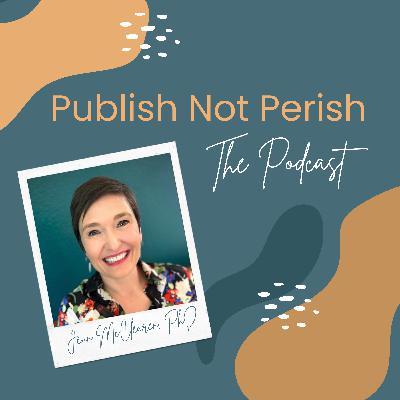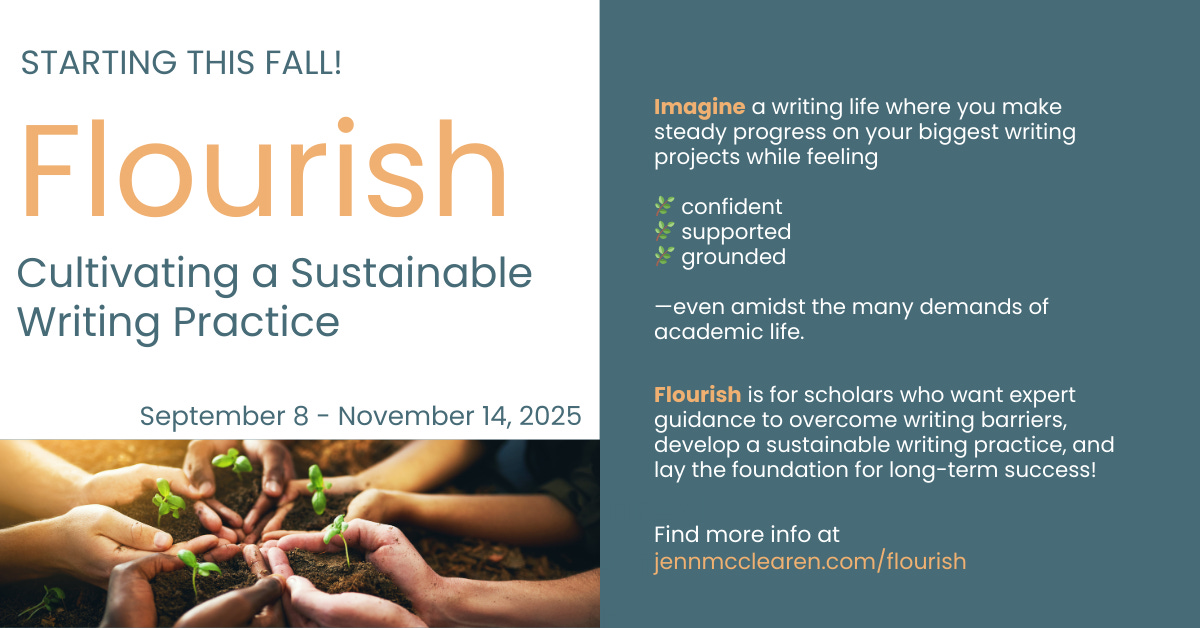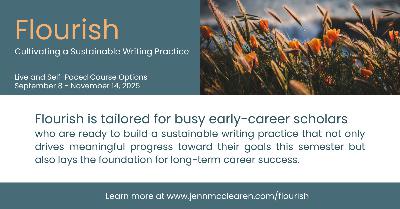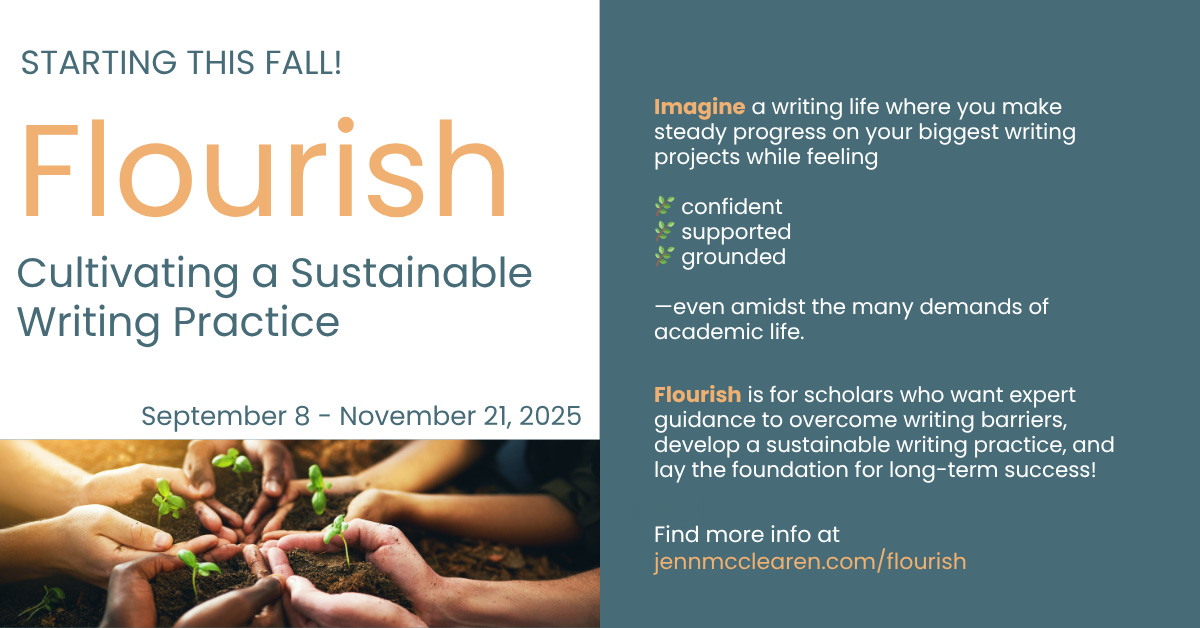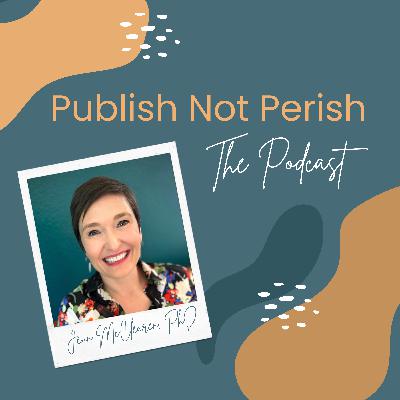Discover Publish Not Perish
Publish Not Perish

 Publish Not Perish
Publish Not Perish
Author: Jenn McClearen, PhD
Subscribed: 2Played: 39Subscribe
Share
© Jenn McClearen
Description
Publish Not Perish is the podcast for scholars who want to write more—without burning out. Host Dr. Jenn McClearen shares practical tips, honest reflections, and real stories to help you make steady, meaningful progress on your writing with more ease, clarity, and joy.
www.publishnotperish.net
www.publishnotperish.net
23 Episodes
Reverse
Today I’m sharing the story of “Fatima”—a composite of so many scholars I’ve worked with over the years (and, honestly, a little bit of me too). Her dissertation sprint “worked.” She finished, defended, and landed a faculty job. But once she stepped into life as a new professor, the same strategies that got her across the finish line suddenly stopped working altogether. I use her story to explore a tension I see all the time: the difference between being productive in the short term and building a writing practice you can actually sustain over a long academic career. I don’t get into step-by-step systems or productivity hacks here. You can find those any place you look these days. Instead, I invite you to reflect on how your current approach to writing is shaping not just your output, but also your energy, your health, and your relationship to your work. If you’ve ever felt like the only way to make progress is to push harder, longer, and past your own limits, this episode is a gentle pause. A chance to ask a different question: what would it look like to write in a way that supports your life, instead of slowly consuming it? Get full access to Publish Not Perish at www.publishnotperish.net/subscribe
In this episode of PNP: The Podcast, we’re diving into the urgency trap. You know that feeling that everything needs your attention right now—the ping of an email at 9 PM, the “quick” request that derails your writing time, the sense that you’re always behind no matter how much you do? We’ll explore why academia runs on manufactured urgency, how it sucks energy from your important work and well-being, and what it looks like to reclaim your time for what actually matters. It’s time to step out of the constant rush, take a breath, and start shaping your days around what truly deserves your energy. Get full access to Publish Not Perish at www.publishnotperish.net/subscribe
Today’s episode is a little different from the rest of my “leaving academia” series—because instead of talking about what I left behind, I’m sharing what I moved toward: building a business as a scholarpreneur, specifically, a writing coach and developmental editor.I’ll walk you through how I found my way into academic-adjacent entrepreneurship, how I reconciled my skepticism about “business,” and what it’s looked like to build something that actually aligns with my values. If you’ve been craving a way to keep your scholarly work alive—just without the institution calling the shots—this episode will speak to you.I’ll also share some of the lessons I’ve learned along the way—the mindset shifts, the unlearning, and the surprising overlap between running a business and thriving as a scholar. My hope is that this conversation helps you imagine new possibilities for your own career path, whether that means starting a side project, offering coaching or editing services, or simply rethinking what scholarly or academic-adjacent work can look like.For those considering this path, I recommend Paulina Cossette, who has a podcast and a course on becoming an academic entrepreneur.Podcast: https://podcasts.apple.com/us/podcast/leaving-academia-becoming-a-freelance-editor/id1765526180Course: https://acadiaediting.com/becomeaneditor/ Get full access to Publish Not Perish at www.publishnotperish.net/subscribe
In today’s episode, I want to talk about something that can feel tender, even somewhat disorienting—but also full of possibility. We’re talking about what it means to think beyond working in academia and how to understand the incredible set of skills your PhD gave you.Because yes, academia gave you expertise—but it also gave you other important skills: the ability to learn deeply, think critically, manage complex projects, and solve difficult problems. And those skills? They’re valuable in more places than you might be able to imagine at this moment.I share some reflections from my own transition out of academia and the mindset shifts that helped me see myself differently. We’ll also talk about how to approach a potential career pivot with the curiosity and strategy of a researcher.You don’t need to have all the answers right now. You just need to start asking new questions—and to trust that the skills you already have can take you somewhere meaningful.Content warning: I drop the F-bomb when talking about the Tr*mp administration because I don’t know how not to. Also, all my podcast episodes are marked explicit just in case.This episode is a part of a series for the next couple weeks on leaving academia that I introduced earlier this week:https://www.publishnotperish.net/p/its-time-to-talk-about-leaving-academia Get full access to Publish Not Perish at www.publishnotperish.net/subscribe
If you’ve ever opened an email from a journal only to see the words “After careful consideration, we regret to inform you,” this episode is for you. In today’s conversation, I’m talking about what to do when your article gets rejected—and more importantly, why that rejection doesn’t mean the end of your project. I know firsthand how gut-punching those messages can feel, but I also know that rejection is one of the most common—and least talked-about—parts of academic life. In this episode, I’ll share why rejection happens far more often than you think, how to take care of yourself in those first few tough days, and how to decide what to do next without losing confidence in your work.My goal is to help you see rejection not as a verdict, but as information—something you can learn from and use to make your writing even stronger. Whether you’re deciding how to interpret reviewer feedback, wondering if your piece was a poor fit for the journal, or just needing reassurance that you’re not alone, this episode will meet you right where you are. So if you’ve been sitting on a rejection and aren’t sure what to do next, take a deep breath, grab your favorite coping beverage, and join me. You might just walk away seeing this moment in an entirely new light.Related Post: Get full access to Publish Not Perish at www.publishnotperish.net/subscribe
In this episode of Publish Not Perish: The Podcast, we’re tackling one of the most challenging questions in academic writing: why does your research actually matter? Not just within your subfield or to a handful of experts, but to the world beyond it.This episode is a continuation of the newsletter I sent out earlier this week:https://www.publishnotperish.net/p/why-should-anyone-care-about-yourIn this episode today, I revisit four deceptively simple questions I shared in that newsletter—about who’s affected by your research, what might change if people saw it differently, what larger pattern it reveals, and who beyond academia might need this knowledge—and explore what makes them so challenging to answer.This isn’t about adding another checklist to your writing process; it’s about uncovering the deeper meaning behind your work and reconnecting with why you started it in the first place.Along the way, I share my own struggles with significance, the resistance that surfaces when we ask hard questions, and why sitting in that discomfort is often where the most powerful insights emerge. Get full access to Publish Not Perish at www.publishnotperish.net/subscribe
In this episode, I’m continuing the conversation I started in this week’s newsletter called “Writing Should Be Hard.” You can read the newsletter from Tuesday here:https://www.publishnotperish.net/p/writing-should-be-hardIn this follow-up podcast, I go a little deeper into why writing feels so challenging and how we often slip into easier tasks that make us feel productive while sidestepping the harder intellectual work our projects really need. I also share some ideas about how to recognize those patterns, approach them with compassion, and build your capacity to stay with the work that matters most.If you’ve been wrestling with doubt, avoidance, or the discomfort of not knowing exactly what you want to say yet, this episode is here to remind you that the struggle is part of the process and that you’re not alone in it. Get full access to Publish Not Perish at www.publishnotperish.net/subscribe
When it comes to research and writing, many of us struggle to determine whether we're doing necessary intellectual work or simply procrastinating with more reading, thinking, and research.Don’t get me wrong. Reading, thinking, and researching are all essential parts of the process, and it can be difficult to determine how long we should spend in this phase, which I refer to as the discovery phase. I discuss this experience in the newsletter from earlier this week:https://www.publishnotperish.net/p/the-real-reason-your-writing-projects(That newsletter also has a download for paid subscribers on how to estimate how long writing projects will take you!)In this episode, I share how to spot the difference between discovery time and wheel-spinning. You’ll hear the signs that you’re making real intellectual progress and the signals that you might be avoiding the hard work of writing. Most importantly, I’ll talk about how to navigate that gray zone with more confidence so you can honor the creative mess of scholarship while still moving your projects forward. Get full access to Publish Not Perish at www.publishnotperish.net/subscribe
In this shorty episode, I’m unpacking the idea that many of us hold of balance as as a destination that one day we’ll arrive at. We often imagine it as equal time for research, teaching, family, and self-care every week—but real life doesn’t work that way. Balance is a practice that requires constant adjustment and recalibration for different seasons of life. I’ll share how this plays out in academic life and invite you to see balance not as the arrival point, but as presence, intention, and knowing what can slide this week so you can focus on what matters most. Get full access to Publish Not Perish at www.publishnotperish.net/subscribe
In this episode, I’m digging into why so many of us feel like we have to give 100% to everything—and why that mindset is especially hard to shake in academia. If you’ve read my recent newsletter, you know I’ve been talking about the “B+ mindset,” or the idea of strategically lowering your standards in certain areas so you can protect your best energy for the work that matters most. Today, I take that conversation a step further and unpack the deeper reasons behind our perfectionism: the A+ student identity many of us carry, the connection to imposter syndrome, and the way academia itself sets us up to feel like we’re never doing enough.I also talk about who’s most vulnerable to these pressures—early career scholars and those from minoritized identities. You’ll hear examples of what B+ work looks like in teaching, service, writing, and beyond, along with strategies for protecting your time and energy without compromising your career. My hope is that this episode helps you reframe what it means to do meaningful work in academia—and reminds you that your value as a scholar isn’t measured by how close you get to “perfect” on every single task. Get full access to Publish Not Perish at www.publishnotperish.net/subscribe
In this episode, I’m digging into a question so many of us wrestle with: how do we make academic choices that actually reflect what we love and want, instead of squeezing ourselves into an institutionally sanctioned version of success? I share a bit of my own story—how I started out passionate about teaching but quickly learned the pressure to publish could push me in a different direction. Along the way, I realized that while trade-offs are inevitable, we can still be intentional about shaping careers that feel like ours.We’ll also get real about the system itself, like the vague expectations, the culture of overwork, and the perfectionism that keeps us trying to give 100% to everything. The truth is, you don’t have to do it all. You can make choices that align with your priorities, your joy, and your long-term goals. Tune in to hear strategies for evaluating where your energy is going, letting go of what doesn’t serve you, and focusing on what matters most right now. Get full access to Publish Not Perish at www.publishnotperish.net/subscribe
Ever feel like every other scholar is writing faster, better, and with more ease than you while you’re stuck belly flopping into your draft? I’m here to reassure you that you’re definitely not doing it wrong. In this episode, I share the story of 7-year-old me spending eight determined hours trying to learn to dive and how that experience became a metaphor for building a resilient writing practice. We’ll talk about why knowing what good writing looks like isn’t the same as being able to produce it and how reframing your struggles can help you stay in the water long enough to make real progress.I’ll share two evidence-backed ways to build resilience in your writing life: reframing how you interpret challenges and cultivating the kind of writing community that truly supports your process. You’ll walk away with a new perspective on messy drafts, slow timelines, and the myth that everyone else is doing it better. Belly flops, it turns out, are not failures; instead, they’re training your brain to dive deeper next time.Read the article mentioned in this episode: Resilience Decoded: Brain, Genes, and Adaptation Get full access to Publish Not Perish at www.publishnotperish.net/subscribe
Note that I have an error in the episode; the Fall Writing Planning Workshops are Aug. 21 and 25 (not 26!). If you’ve ever felt like writing goal-setting only leaves you feeling behind, this episode is for you. I’m breaking down why so many traditional goal-setting methods fail academic writers—and what you can do instead. I share a framework I teach in my Flourish course called good, better, best goals, which gives you a flexible, reality-based way to define progress. Whether you’re drafting a book, revising an article, or juggling multiple projects, this method helps you stay motivated and realistic without giving up on your ambitions.I also walk you through how we use this framework inside the Flourish course, and how you can start applying it on your own right now. And if you’re craving a little structure heading into the semester, join me for one of my free Fall Writing Planning Workshops later this month. We’ll use the good, better, best method to build a fall writing plan that actually fits your real life—interruptions and all. It's a perfect way to test out the approach before committing to anything longer term.Register for the Free Fall Writing Planning Workshop: August 21 at 1pm ET | 7pm CESTAugust 25 at 12pm ET | 6pm CEST Get full access to Publish Not Perish at www.publishnotperish.net/subscribe
What if the phrase “I need to find more time to write” is actually keeping you stuck? In this episode of Publish Not Perish: The Podcast, I challenge one of the most common beliefs about academic writing and explain why that phrase leads us into a scarcity mindset. I share a story from my time as junior faculty at a top research university, where I was constantly juggling research, teaching, and service—each one framed as essential. Like many academics, I tried to squeeze writing into whatever time was left after handling the "urgent" stuff. But the real shift came when I realized the issue wasn’t time—it was how I was (or wasn’t) protecting the time I had.If you’ve been waiting for a magical stretch of time to appear so you can finally write, this episode is for you. I walk through practical strategies for reclaiming your time and energy: naming your true priorities, embracing “good enough” in non-priority areas, and gently pushing back against the culture that says everything must be excellent. You’ll hear how small, intentional shifts can help you stop feeling like a victim of your calendar and start actively protecting your writing time. And if you want support making that shift sustainable, check out my course Flourish: Cultivating a Sustainable Writing Practice, where we build systems to make writing fit into your real life. Get full access to Publish Not Perish at www.publishnotperish.net/subscribe
Have you ever sat down to write and immediately started second-guessing every sentence? Chances are that the problem isn’t your ideas. It’s the audience in your head.In this episode, I dive into the concept of imagined audience and how it can either support or sabotage your writing. Most academic writers don’t realize they’re writing for someone who’s not actually their reader. Instead, they write defensively for a critical advisor, an intimidating colleague, or a harsh reviewer from years past.You'll learn how to identify when you're writing for the wrong audience, how to shift out of self-doubt and perfectionism by changing who you're writing for, and a three-stage strategy to guide your writing through different phases of the process.This episode builds on Episode 3: Writing to Think vs. Writing to Communicate, where I introduced the idea that we need to write through our thinking, not wait until it’s all figured out.Listen to that episode here: https://www.publishnotperish.net/p/writing-to-think-vs-writing-to-communicate?r=3ey1lIf you’ve ever felt blocked, anxious, or overly defensive while writing, this episode will help you reconnect with the joy and freedom of putting ideas on the page—and remind you that writing gets easier when you write for the right audience at the right time.The next time writing feels unusually difficult, ask yourself, who am I writing for right now? Then, give yourself permission to shift that audience to someone more helpful and kind. Get full access to Publish Not Perish at www.publishnotperish.net/subscribe
In today’s episode, I’m talking about something we don’t discuss enough in academia: getting professional help with your writing. Whether you're working on a book manuscript or a journal article, there are times when writing groups and peer feedback just aren’t enough. That’s when editors and coaches can make a huge difference. I walk you through the different types of editing, from developmental to copyediting, and explain what each one actually does (because let’s be honest, it’s confusing out there!). I also talk about the difference between coaching and editing, how to determine which one you need, and why sometimes the best support comes from someone who can do both.I also discuss how I approach this work, as a coach and developmental editor, and why I believe that working with both the writer and the writing can be so effective. If you're feeling stuck, unsure what your manuscript needs next, or simply tired of trying to untangle things on your own, this episode will give you a clearer picture of the kinds of support available and how they can help you move forward. Professional help isn't a shortcut or a crutch. It's a strategic investment in your writing and your career.Want to learn more about my coaching and editing services? Read all about it at jennmcclearen.com/1-1coaching. Get full access to Publish Not Perish at www.publishnotperish.net/subscribe
In this episode, I’m talking about something that comes up all the time in my work with scholarly writers: the guilt that you’re not the “right” kind of academic writer. Maybe you don’t write every day, or maybe you only feel productive under deadline pressure. Whatever the case, you’ve internalized the idea that you’re doing it wrong. But here’s what I want you to know: you only need to change your writing habits if they aren’t working for you. If your process moves your work forward without depleting you, there’s nothing to feel guilty about.To help you get clarity, I walk you through four writing archetypes I see among successful academic writers: the Daily Devotee, the Summer Scholar, the Deadline Daredevil, and the Project Juggler. These aren’t prescriptive categories—they’re possibilities to help you reflect on what fits your real life, job demands, and energy levels. I also offer a reality check about how our writing identities sometimes need to evolve. If you’ve been trying to force yourself into a method that doesn’t work for you, this episode is your permission slip to let that go. Get full access to Publish Not Perish at www.publishnotperish.net/subscribe
You probably didn’t become a scholar just to write for a handful of specialists. If you’ve ever felt the pull to share your work with a wider audience—to write something that’s both rigorous and resonant—this episode is for you. We’re talking about crossover books: academic books that travel beyond your department, speak across disciplines, and connect with curious readers beyond the university.In this episode, I break down what a crossover book is, why university presses are increasingly interested in them, and how you can begin writing one without sacrificing scholarly depth. You’ll hear five practical tips for writing with clarity, intention, and voice—so your research can reach more people and have a bigger impact. Writing accessibly is a skill you can learn, and this episode offers a path to help you get started. Get full access to Publish Not Perish at www.publishnotperish.net/subscribe
If you’ve ever ended the day feeling mentally wiped out with little real writing progress to show for it, this episode is for you. We’re diving into why that scattered, depleted feeling is so common—and what it tells us about the way we work. Drawing on Cal Newport’s idea of deep work, we’ll explore how academic writers can protect their focus and energy, even in the midst of full schedules and constant demands.You don’t need endless hours or a cabin in the woods to do your most important writing—you just need a bit of intention. I’ll share five practical strategies to help you carve out distraction-free time, match tasks to your best brain energy, and build small rituals that support sustained focus. If you’re craving more clarity, less mental fatigue, and real momentum in your writing, this episode is for you, my friend! Get full access to Publish Not Perish at www.publishnotperish.net/subscribe
You know that feeling when you finally sit down to write—tea brewed, document open—only to type a few sentences and think, What am I even trying to say? I feel you, friend! In this episode, I talk about a shift that’s helped me and so many of my clients: understanding the difference between writing to think and writing to communicate.We’ve been trained to believe writing should sound polished from the start, but most meaningful academic work begins in the mess. I share practical ways to embrace the exploratory parts of writing—brainstorming, voice notes, Post-its—and take the pressure off your early drafts.If you’ve ever felt like a bad writer just because your first words didn’t shine, this episode is for you. Let’s reframe what counts as progress and make space for the thinking that has to happen before the clarity comes.Related Content:https://www.publishnotperish.net/p/what-counts-as-writing Get full access to Publish Not Perish at www.publishnotperish.net/subscribe


